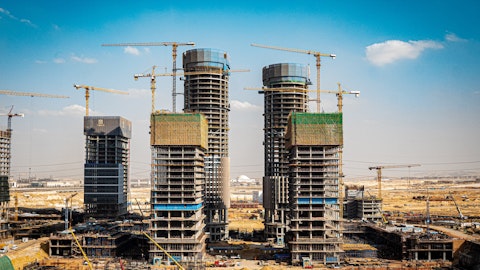And it’s one of those things that once it gets into the network of the fraudsters, until you react and put in countermeasures, which we have done and most of our competitors have done, once they get in the door it’s in the environment we’re in, it’s kind of hard to – it still takes six to seven months to go through the process, even though you can technically evict in for non-payment in Atlanta. The reality on the ground is, is that it’s a process. It’s crowded. There are a lot of people trying to get through the process, so it’s slow. So there was a – there’s an issue in Atlanta that’s separate and apart from any of the supply issues. It’s just we’ve got people that are – we’ve got folks in our apartments that we’re working through to get out.
My guess is most of our competitors do as well. But again, that’ll run its course over the next four to six months. And I think Atlanta will be fine.
Ric Campo: I’ll give you a personal example of this issue. So last year I rented an apartment in Chicago. I opened a bank account at Bank of America that has thousands of dollars flowing through it, I opened a Bank of America credit card, which I immediately ran up to the limit and then defaulted on. And by the way, I’ve never lived in Chicago. I never released an apartment or opened a bank account or had a Bank of America credit card that I defaulted on. My credit score went to 510. And just recently I tried to rent an apartment at a competitor in Charlotte. And the competitor happened to be – happened to know my name because they’re – we’re pretty well known. And they sent the information to a regional Vice President and said, by the way, is Ric Campo really trying to lease an apartment in Charlotte?
And the answer was, no, he isn’t. And so this fraud is really interesting, and it’s sort of a cottage industry on the internet where people go on the internet and say, how do you live in an apartment for free for six months or for three months or for nine months? And then they cipher through the system and figure out how to do it. Six months to get my credit score back to where it should be and get all the fraud off of my personal credit report. But having been personally where my identity was stolen and trying to rent apartments with our competitors has been a real eye-opener. And it’s something that unfortunately is happening in our industry.
Jamie Feldman: Yes, it’s crazy. All right. Well, thank you very much for the color and I appreciate you letting me squeeze in that last question.
Ric Campo: Sure.
Operator: Our next question will come from Michael Goldsmith with UBS. You may now go ahead.
Ami Probandt: Hi, this is Ami Probandt. I’m thinking about the long-term outlook for the portfolio and how supply impacts it. Do you think that you can avoid a large chunk of potential future supply by being selective in the sub-markets that you acquire or develop in? Or is supply just really not avoidable in the Sunbelt?
Ric Campo: Well, I think as Keith pointed out earlier our portfolio, we diversify our portfolio geographically and through product. And the way we do it product-wise is we buy in sub-markets, maybe buy properties that have different price points. And so new development oftentimes is it has to be because of the cost structure in building new properties, you have to be generally at the top of the market. When you think about housing in America and including rental housing, not just single-family for sale, we have a shortage of affordable apartments in America, a big shortage. And so the challenge with that shortage is that the numbers don’t work to build to that middle market. The numbers have to be – when you bring new development, and it has to be at the top end of the market and so – or to the middle top end of the market.
And so when you have a portfolio like Camden’s that has a lot of middle market properties that where you think that where the rents are 30%, 40% less than what it costs to do a new development. People are not going to lower their rents unless they have to, which today they don’t have to, you don’t have any major oversupply anywhere, including the Sunbelt. You’re in a situation where those folks that are in those middle market properties are not going to move up into the A properties or the top of the market properties because they just can’t afford them. And so that’s – so our portfolio is built for the long haul. We have – we’re going to have some of our properties, as Keith pointed out, that do have competition from new development, which is the top end of our properties.
But a lot of our properties are middle market and they’re not going to be negatively affected. And so – and the idea that Sunbelt supply is always a problem, well, we’ve operated in the Sunbelt for 30 years and we’ve continued to do well in up and down markets and oversupply and undersupply. The good news today is that the market is really efficient. And once a market overshoots supply, guess what? People stop building. And we’ve seen it in all of our markets. And you’re going to be seeing significant declines in starts and in over the next 18 months. And then we’re going to be in a situation where people are going to say, when do you think supply’s going to start in the Sunbelt again after we have really good rent growth towards the end of 2024 and 2025.
So the reason the Sunbelt builds is because we need the supply, because that’s where the job growth is, that’s where the end migration is. That’s where the folks are moving and it’s not that you build just to build, you build to make a reasonable rate of return on your investment. And people in the Sunbelt have done a great job in making a return on their investment, but when they can’t, they stop. And so we’re going to see that stop coming very soon. And then we’ll go back to the cycle where we’ve overshoot on the building didn’t happen. So rents will rise and occupancies will rise faster than normal in 2025 and 2026 as a result of that cycle. And then they’ll catch up with supply in 2027, 2028 and rents will – in occupancies will go down probably some a little, but the bottom line is, is that’s just the normal cycle.





